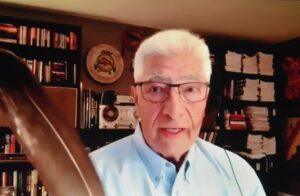Justice Warrior continues to Indigenize the legal system

By Kelly Anne Smith
NIPISSING FIRST NATION— Eminent lawyer Tony Mandamin captured the attention of participants of the virtual Anishinabek Nation’s Migizii Doodem – Eagle Clan Forum when he spoke of the importance of his journey to Indigenize the legal system.
The Migizii Doodem – Eagle Clan Forum, hosted by the Anishinabek Nation Education Secretariat and Labour Market Development Department from May 11 to 13 via Zoom, focused on Anishinaabemowin, culture, education, skills training and employment. An opening song by the host drum, Little Migizi Singers, started off the three-day event.
Anishinabek Nation Language Commissioner Barbara Nolan Nesdotmookiid (Causer of Language Understanding) spoke first in the language about the importance of promoting Indigenous people.
“I see a great resurgence of our ways, of our teachings. And there has been a resurgence for quite some time. Now they are becoming more open. I’m happy to say that we have to have language and culture together. They go hand in hand.”
The Honourable Leonard S. (Tony) Mandamin shared his journey from Wiikwemkoong Unceded Territory to the Supreme Court – constitutionalizing Treaty rights to hunt for food. He spoke about the first time he had a role model in education— Cecil King, a member of Wiikwemkoong Unceded Territory, set him up for the trail that he followed.
“Here was a member of our own community who was a teacher. I thought very highly of him.”
After being passed over for principal, King went on to earn a doctorate. The educator rose to become Dean of the Saskatchewan Campus of the First Nations University of Canada.
Mandamin earned an Engineering Degree at the University of Waterloo.
“It wasn’t enough.”
At 35 years old, he went to law school at the University of Alberta. Mandamin went on to set up the first Indigenous law firm in Alberta; hiring Indigenous law students. He defended in a momentous case, R. v. Badger, a case on treaty hunting rights in the Prairie Provinces.
Alberta, Saskatchewan, Manitoba and the federal government were opposed. Mandamin won the often-cited case with the Supreme Court of Canada confirming the continued existence of the Treaty right to hunt for food.
“There were 22 lawyers in court and six of us were Indigenous lawyers,” he recalls. “The hero in the case was Dan McLean. I had him as my Elder witness on Treaty 8 and the right to hunt. He testified at trial.”
“All these years, I never had to have a license to hunt for food. Never. This is something new to me,” explained Dan McLean in his testament. “But there are new laws which come up without us knowing what laws there is. For instance, like the law that I have, why do I have to when I have a right? I have a right. I can hunt anytime when I want for food to feed my family. I raised 14 children by the way, and I never was on welfare.
The Supreme Court of Canada ruled in favour in 1996.
“The Treaty 8 right to hunt for food was recognized. By implication, all of the Treaty rights of hunting across the country had standing. Now they are constitutionally protected.”
Mandamin went on to preside over the first Indigenous justice system in provincial court in Canada.
Later in 2012, Madamin as a federal court judge sat on the Williams Treaties Trial which involved land surrenders and harvesting rights.
“When I was sworn in, both as a provincial court judge and as a federal court judge, I took the oath both times on an Eagle Feather and a Bible. Here in Alberta, all the provincial courts, and I believe can be available in all the Queen’s Bench Courts, anybody who is testifying, can take their oath on an Eagle Feather.”
Mandamin talked about being most proud of chairing the Federal Court Aboriginal Liaison Committee where Elders educated judges in their own way.
In 2019, weeks after his retirement, he started a Master’s program at the University of Alberta.
He awaits the examination on his Master’s thesis on Indigenous Justice and hints there may be a book in his future. Mandamin advises that education can come at any age.
“To the students out there: dream. Decide what you want to do. Education is your ticket to getting there and doing it. Here I am at 75 and I’m still a student.”
Mandamin sends encouragement for when you run into an obstacle or a hardship in your life.
“You keep going. You deal with it or you go around it but you keep going. That’s what I learned when I failed Grade 13 and had to go back to Scollard Hall. It was no big problem,” he recalls. “And then the next time I ran into an obstacle, it wasn’t such a bother. I would just keep going. It certainly worked well in the Badger case because losing the case at every level of court until we got to the Supreme Court—those obstacles, those hardships— if you keep going, they make you stronger and more able to do what you want to do.”

